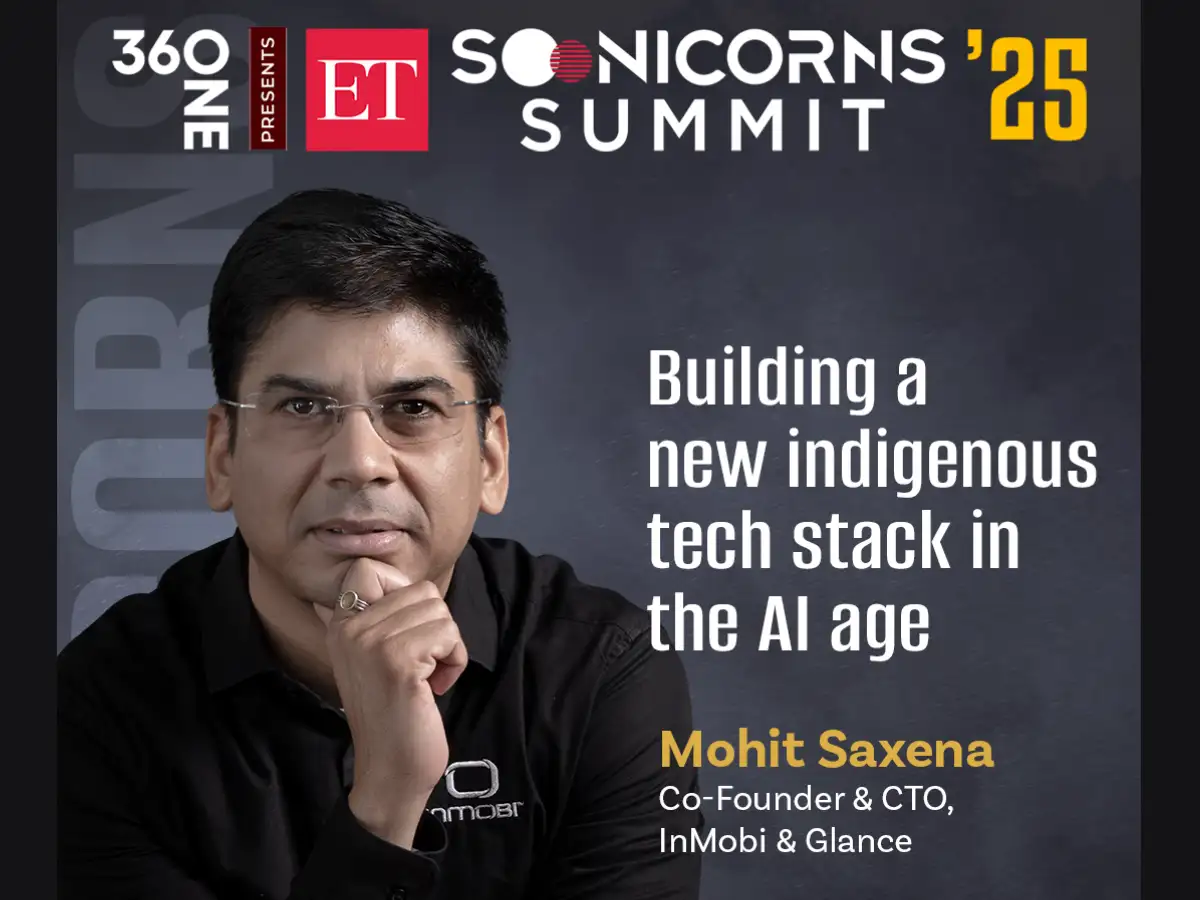His session, ‘Building a New Indigenous Tech Stack in the AI Age’, comes at a time when questions of code sovereignty, AI infra ownership, and local optimisation are gaining urgency. For engineers, product leaders, and deep-tech founders, this promises to be a session rooted not in theory—but in the architectural realities of building AI from first principles.
A summit built for tech leaders and AI founders
The ET Soonicorns Summit 2025 in Bengaluru puts a sharper lens on scale: From Lab to Revenue—The Billion-Dollar Blueprint for Scaling Indian AI Startups.
That’s where Mohit Saxena’s fireside chat could offer a timely provocation.
InMobi completes 20 years since its inception, tracing its evolution from its early days as a mobile advertising network to its current phase of building a generative AI-powered commerce platform through Glance AI.
InMobi became a unicorn in 2011—well before such achievements were commonly celebrated in India’s startup ecosystem. Over time, that early breakthrough gained recognition at the national level.
Today, InMobi has over 2,000 employees and a growing presence across AI, commerce, and advertising, and with it Mohit Saxena is primed to share his founder-builder journey. At a time when most startups were riding software-as-a-service (SaaS) and cloud APIs, Saxena went the hard way: assembling a world-class tech stack in-house.
Expect Saxena, who brings experience in scaling infrastructure-led innovation, to dive deep into what it takes to build and own your stack in a world dominated by hyperscalers and open-source dependencies, especially as AI shifts the ground beneath every tech product.
Inside the Fireside: What to expect from Saxena’s session
As co-founder of InMobi and a hands-on engineering leader, Mohit Saxena brings a rare blend of technical rigour and scale experience. At the ET Soonicorns Summit 2025, his Fireside chat is expected to offer sharp insights for India’s next wave of startup builders.
In a startup landscape increasingly shaped by pre-built APIs and plug-and-play AI models, Saxena is expected to explore why India’s next generation of AI startups may need to invest in building foundational code and infrastructure. Rather than chasing marginal gains through better prompts, Saxena may argue that deeper breakthroughs will come from stronger architectural pipes—purpose-built, scalable, and owned.
While the session will evolve live, here are five key themes we may hear:
1. Beyond copy-paste engineering: Why India needs original tech thinking
With generative AI models and global open-source tools at everyone’s fingertips, Saxena may argue that it’s no longer enough to assemble. The real value lies in solving India-first problems with original logic layers—whether in local language UX, on-device inference, or real-time analytics for low-bandwidth geographies.
2. Infrastructure questions startups can’t ignore
From compute shortages to data sovereignty, India’s AI startup ecosystem is hitting infrastructure chokepoints. Expect Saxena to reflect on whether Indian startups can reduce external dependencies—by building internal DevOps maturity, exploring alternative hardware architectures, or rethinking their cloud strategy.
3. Treating AI as core architecture, not a feature
Drawing from his experience scaling InMobi’s ad tech engines and data platforms, Saxena might discuss how AI should be embedded deeply into the software stack—not just used for add-on features like chatbots. This means viewing AI as an operating logic that informs business decisions, not just outputs.
4. Building with constraints: Talent, tools, and tech debt
India has the engineering talent—but do early-stage startups have the right toolchains and frameworks to harness it effectively? This session could offer grounded advice on setting up internal platforms, balancing speed with scalability, and navigating the trade-offs between open-source and custom builds.
5. Leading tech teams through uncertainty
Finally, Saxena may speak candidly about leadership in the AI age—what it takes to scale a tech-first organisation when the ground beneath is shifting. Whether it’s hiring for adaptability, managing burnout, or prioritising long-term architecture over short-term wins, his experience will resonate with founders navigating similar scale journeys.
Key themes at ET Soonicorns Summit 2025: Scaling playbooks and global disruption
To be held on 22 August 2025 in Bengaluru, this year’s ET Soonicorns Summit is India’s largest gathering of soonicorns.
The Summit promises hard-won lessons from both labs and boardrooms fueling India’s innovation surge.
Speakers will dissect how India’s next-generation startups are integrating AI not as a headline gimmick, but as a serious lever for growth, valuation, and global positioning. Here’s a preview of the agenda shaping the country’s soonicorn-to-unicorn pipeline:
AI as the new centre of gravity: Sessions will unpack India’s ambitions in foundational AI—spanning GenAI (generative) startups, large language models (LLMs) built for Bharat-scale, and indigenous tech stacks. From agentic models and data infrastructure to capital flows into core science, the focus is on whether Indian startups can lead the AI era—not merely adapt to it.
Where is the AI capital going? Is 2025 the breakout year for India’s AI-native startups? Investor roundtables will analyse funding shifts, asking whether capital is backing deep tech moonshots or favouring vertical AI models with near-term return on investment (ROI). Expect sharp takes from top VCs and AI company founders on what it will take to back generational AI ventures from India.
The real scale challenge: Beyond product and models, Indian AI startups now face the uphill task of scaling talent, building defensible IP, and navigating regulatory grey zones. These sessions will decode playbooks for building IPO-readiness, spotlighting how startups are tackling compliance, global go-to-market GTM strategies, and deep technical hiring to build AI companies with staying power.
Whether you’re a product manager figuring out how to integrate AI, a founder planning your first LLM, or a CTO tired of third-party limitations—this could be your roadmap.
In a world where every startup is racing to build the next ChatGPT, Mohit Saxena is pausing to ask a deeper question: Should India build its own stack before it builds its own stars?
On August 22, come hear why that question matters now more than ever.
Register now for the ET Soonicorns Summit 2025 in Bengaluru and join a Fireside chat that might just light the way for India’s next billion-dollar idea.
360 One is the presenting partner of the ET Soonicorns Summit 2025.
(This article is generated and published by the ET Spotlight team. You can get in touch with them at etspotlight@timesinternet.in.)




